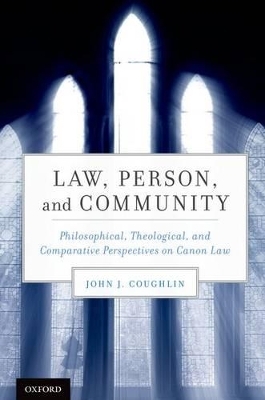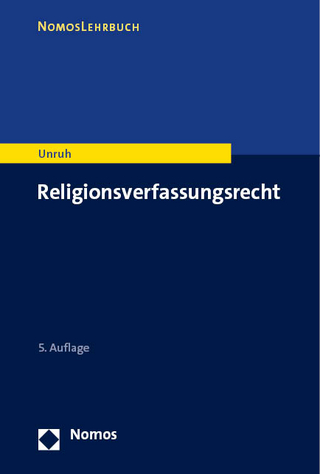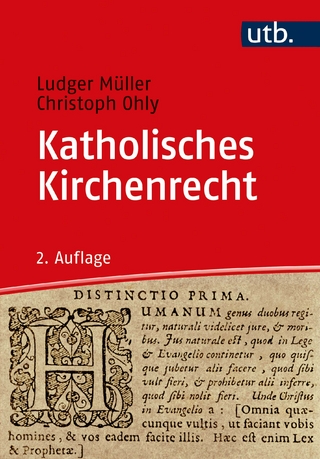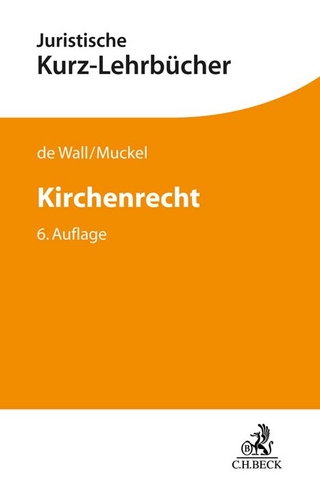
Law, Person, and Community
Oxford University Press Inc (Verlag)
978-0-19-975677-3 (ISBN)
on Canon Law takes up the fundamental question "What is law?" through a comparative study of canon law and secular legal theory.
Law, Person, and Community: Philosophical, Theological, and Comparative Perspectives on Canon Law takes up the fundamental question "What is law?" through a comparative study of canon law and secular legal theory. Canon law is analogous to the concept of law described by secular theorists such as Austin, Kelsen, Holmes, and H. L. A. Hart. Consistent with the secular concept, canon law aims to set a societal order that harmonizes the interests of individuals and communities, secures peace, guarantees freedom, and establishes justice. At the same time, canon law reflects a claim about the spiritual end of the human person and religious nature of community.
The comparison of one of the world's ancient systems of religious law with contemporary conceptions of law rooted in secular theory raises questions about the law's power to bind individuals and communities. For example, to what extent, does each of the approaches to law reflect the theory of Austin which understands law as a command given by the sovereign and backed by the coercive power of the state? Or, as H. L. A. Hart suggested, does law require an additional internal meaning that carries the power to bind? If internal meaning is a necessary constituent to law, how might religious and secular conceptions of it differ? In addition to these questions, Law, Person, and Community asks the fundamental question "What is law?" through a comparative study of canon law and secular legal theory. This book also includes comparative consideration of the failure of canon law to address the clergy sexual abuse crisis, the canon law of marriage, administrative law, the rule of law, and equity. Professor John J. Coughlin employs comparative methodology in an attempt to reveal and contrast the concepts of the human person reflected in both canon law and secular legal theory.
John Coughlin is a Professor of Law at the University of Notre Dame. Prof. Coughlin served as professor of canon law of St. Joseph's Seminary in New York from 1994 to 2001. He also served the Archdiocese of New York as a judge in the Appeals Tribunal, as vicar of canonical and legal aspects of health care, and as a member of the boards of several Catholic hospitals and educational institutions. During the summer of 1998, Father Coughlin was a member of the delegation of the Holy See to the United Nations treaty conference that established the International Criminal Court.
TABLE OF CONTENTS ; Preface and Acknowledgments ; Abbreviations ; Introduction ; I. Knowledge ; II. Law ; III. Person ; IV. Community ; V. An Overview of This Study ; Chapter 1 Canon Law and Anthropology ; I. Anthropology and the Foundation of Law ; II. Anthropological Characteristics ; A. Human Nature ; B. The Body ; C. The Soul ; D. Reason ; E. Affect ; F. Conscience ; G. Free Will ; H. Memory ; I. The Person as Social Being ; J. The End of the Human Person ; III. Conclusion ; Chapter 2 Canon Law and Theology ; I. Canon Law: Ordinance of Faith and Reason ; A. Biblical Anthropology ; B. Historical and Ontological in Canon Law ; C. Anthropology and Revelation ; D. Epistemology and Canon Law ; II. The Theological Justification of Canon Law ; A. Thomas, Luther, and Calvin ; B. Charism and Institution ; C. Communio and Canon Law ; III. Conclusion ; Chapter 3 Canon Law and Natural Law ; I. Human Nature as a Foundation for Law ; A. The New Natural Law Theory ; B. The Function of Natural Law in Canon Law ; C. The Relation Between Natural Law and Theology in Canon Law ; II. Classical and Modern Conceptions of Law and Reason ; A. The Classical Understandings of Law and Reason ; B. Law and Competing Modern Conceptions of Reason ; III. Conclusion ; Chapter 4 Canonical Equity ; I. Historical Development of Canonical Equity ; A. The Medieval Canonists ; B. St. Thomas and Suarez ; C. The Standard of Canonical Equity ; II. Canonical Equity in the Twentieth Century Codes ; A. Expressed Equity ; B. The Equitable Character of the Statute ; C. Unwritten Equity ; III. Historical Consciousness and the Objectivity of Canon Law ; IV. Conclusion ; Chapter 5 Development in Canon Law ; I. The Development of Canon Law and the Development of Doctrine ; A. Newman's Anthropological Analogy ; B. Papal Primacy ; 1. Sacred Scripture and Tradition ; 2. Head and Body ; 3. The CIC-1983 ; II. Fundamental Rights in the CIC-1983 ; A. The Meaning of Ius ; B. The Doctrine of Human Dignity and Human Rights Law ; C. The Natural Foundation of Human Rights ; D. The Theological Foundation of Human Rights ; III. A Comparison of Development in Canon Law with Positivism's Secondary Rules ; IV. Conclusion ; Chapter 6 Personalism in Marriage ; I. The Goods of Marriage ; II. The Classical Understanding of Marriage and Secularization ; A. The Medieval Theory of Marriage ; B. The Demise of the Classical Understanding ; III. The Development of the Personalist Perspective in Canon Law ; A. Personalism and Vatican II ; B. Jurisprudence of the Roman Rota ; IV. Conclusion ; Chapter 7 Canon Law and the Secular State ; I. Traditional and Modern Views of Church State Relations ; II. Anthropological Assumptions and the First Amendment ; A. Theological Anthropology ; B. Rationalist Anthropology ; III. The Catholic Schools and the First Amendment ; A. Schools and the One Best System ; B. Strict-Separationism ; C. Problems with Public Policy by Judicial Review ; IV. Conclusion ; Chapter 8 The Impact of Neutral Rules on Hierarchical Churches ; I. The Supreme Court's Neutral Rules Approach ; A. Judicial Deference to Hierarchical Churches ; B. Neutral Rules ; C. Problems with Neutrality ; II. Questions about the Impact of Neutral Rules on Hierarchical Churches ; A. The Secular Court's Competency Over Church Doctrine and Law ; B. Congregational v. Hierarchical Church Government ; C. Tort Liability for Essentially Religious Decisions ; D. Excessive Entanglement and Judicial Review ; E. Generally Applicable Law and Religious Freedom ; III. Conclusion ; Conclusion ; I. Law ; II. Person ; III. Community
| Erscheint lt. Verlag | 26.4.2012 |
|---|---|
| Verlagsort | New York |
| Sprache | englisch |
| Maße | 234 x 160 mm |
| Gewicht | 592 g |
| Themenwelt | Recht / Steuern ► Allgemeines / Lexika |
| Recht / Steuern ► EU / Internationales Recht | |
| Recht / Steuern ► Öffentliches Recht ► Kirchenrecht | |
| ISBN-10 | 0-19-975677-5 / 0199756775 |
| ISBN-13 | 978-0-19-975677-3 / 9780199756773 |
| Zustand | Neuware |
| Haben Sie eine Frage zum Produkt? |
aus dem Bereich


